How a new indie studio created one of the best detective games ever
The story of Paradise Killer.
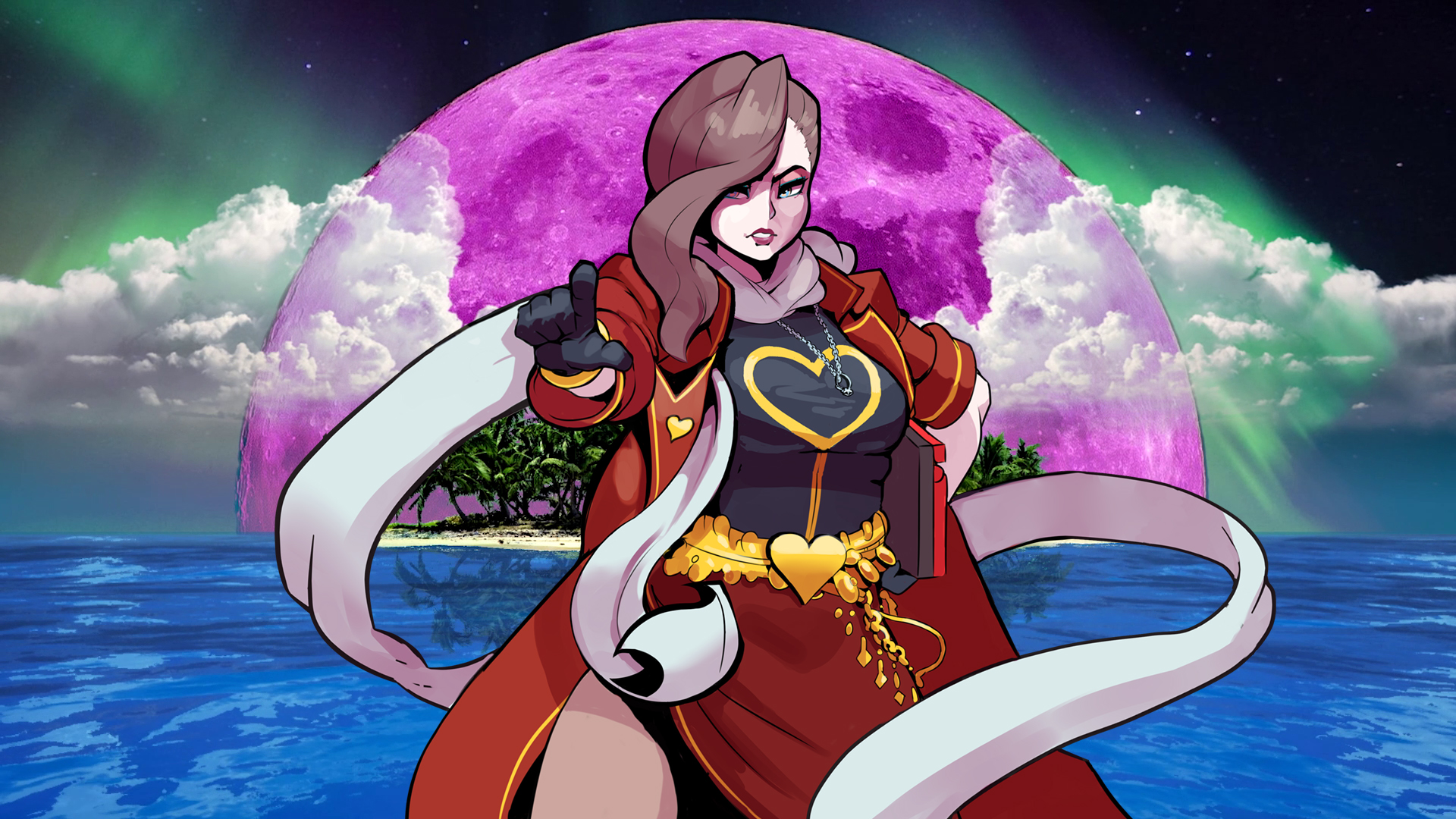
Paradise Killer is one of the biggest surprises of 2020. This open world murder mystery—the first release from indie studio Kaizen Gameworks—succeeds where many other detective games fail, by letting you actually be a detective. There are no missions, objective markers, or prescribed paths to follow. It's just you, an island full of clues, and a killer to catch. And if you accuse the wrong person because you didn't gather enough evidence, well, tough.
You play as the magnificently named Lady Love Dies, a disgraced hotshot investigator brought out of exile to investigate a gruesome mass murder. But the deeper you dig into the crime, the island, and its eccentric inhabitants, the more the waters are bloodied. It's a big, dense, complex conspiracy, and it's your job to untangle it by finding evidence, poking holes in testimonies, and breaking alibis, which you can do in any order, at your own pace.
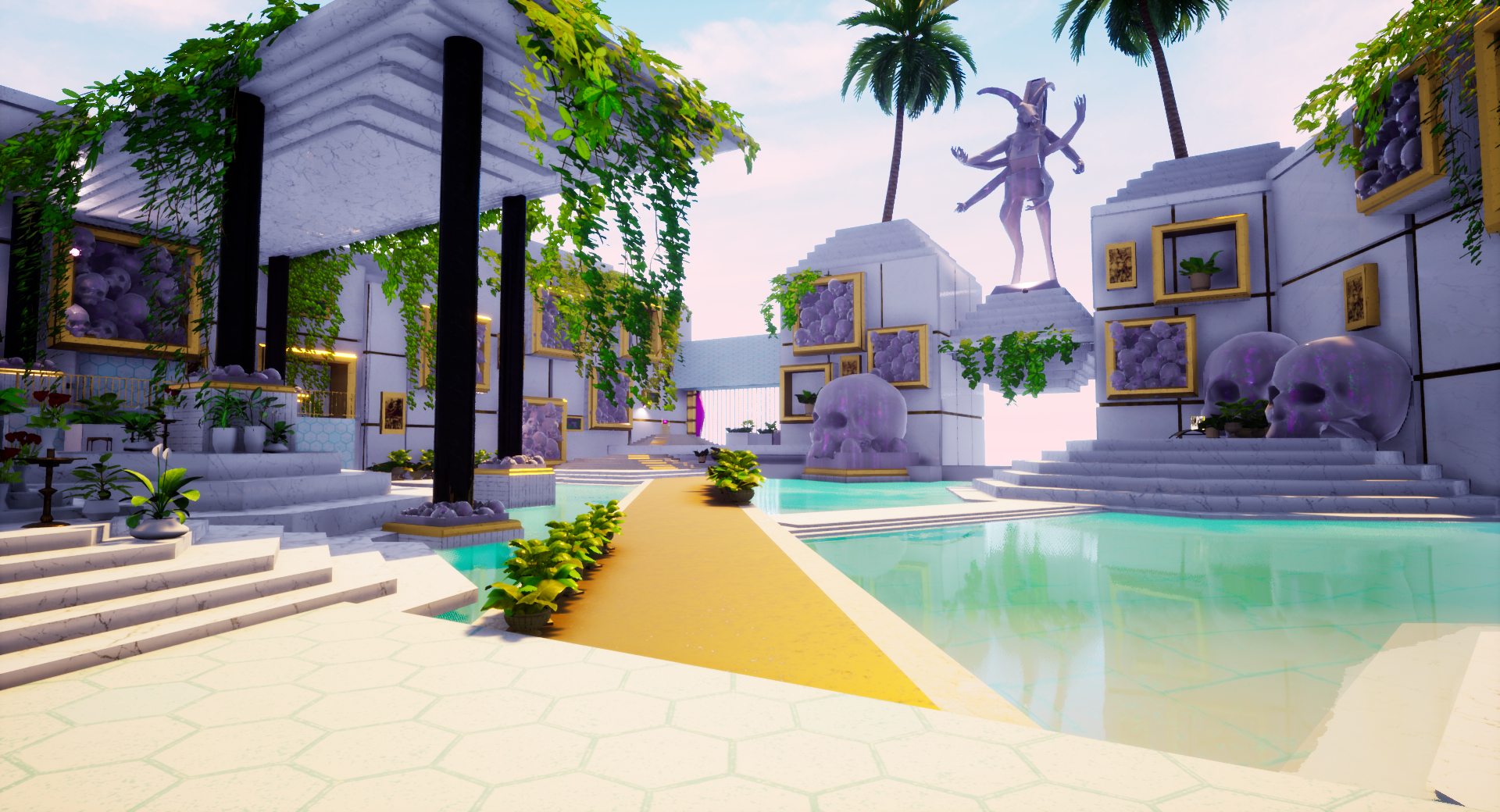
"Very early on, before we started Paradise Killer, Oli and I talked about the idea of a detective game where we just let you go out and be a detective," says Phil Crabtree, technical director and one of the co-founders of Kaizen Gameworks. "A game where you could do anything you wanted in any order. It wasn't really an idea, more a thought I had after playing other games. Then Oli took that and it became the heart of what we have in the game now."
"I'm a big fan of the Danganronpa games, but because they're completely linear, I feel a bit like I'm jumping through narrative hoops," says creative director Oli Clarke Smith, the other half of Kaizen. Danganronpa, for the record, is a series of superb, offbeat murder mystery visual novels by Spike Chunsoft (here's my review of the first one), and a big influence on Paradise Killer.
You might pin the crime on the wrong person, and if you do, you have to live with it
"A designer has written a bunch of stuff, and if you're not in step with them, it becomes frustrating. I always start those games with the best intentions, but end up sitting with a guide on my phone when it comes time to do the trials. They want a specific answer at a specific point in time, and if you don't give it, you fail and have to retry."
Smith wanted to take the investigation elements of Danganronpa, where you explore a 3D space, talk to people, and gather evidence, but broaden the scope, letting you present your evidence at any time. In Paradise Killer, you can trigger the final trial whenever you like, using the clues you've gathered up to that point. You might pin the crime on the wrong person, and if you do, you have to live with it. The game doesn't even tell you if you were right or not.
"Originally the trials weren't in the game at all," remembers Smith. "It was more of a walking simulator in this deserted town. You were speaking to people and piecing together, in your own mind, what you thought the story was about and what happened. But it wasn't hugely satisfying, and so we decided we needed a bunch of systems in there to support that."
Keep up to date with the most important stories and the best deals, as picked by the PC Gamer team.
The game is afoot
This is when Paradise Killer began to mutate into a detective game. Kaizen didn't set out to reinvent the genre; it just happened, and soon it had a non-linear murder mystery on its hands. "It took us ages to find out what the game was," he says. "We only had a short amount of time to ship it because we were using our savings. This game should have come out in 2019, but if it did, it would've been pretty junk. It was lucky we got a publisher deal when we did."
"Giving players the ability to accuse anyone was a tricky thing to do," says Crabtree. "It sounds simple enough, but tying all those things together, and making it feel satisfying, was really hard. Luckily, Oli is really good at following the vision." If something wasn't working, the pair would always go back to the fundamentals of what they wanted the game to be, which Smith established early on and the team stuck to religiously.
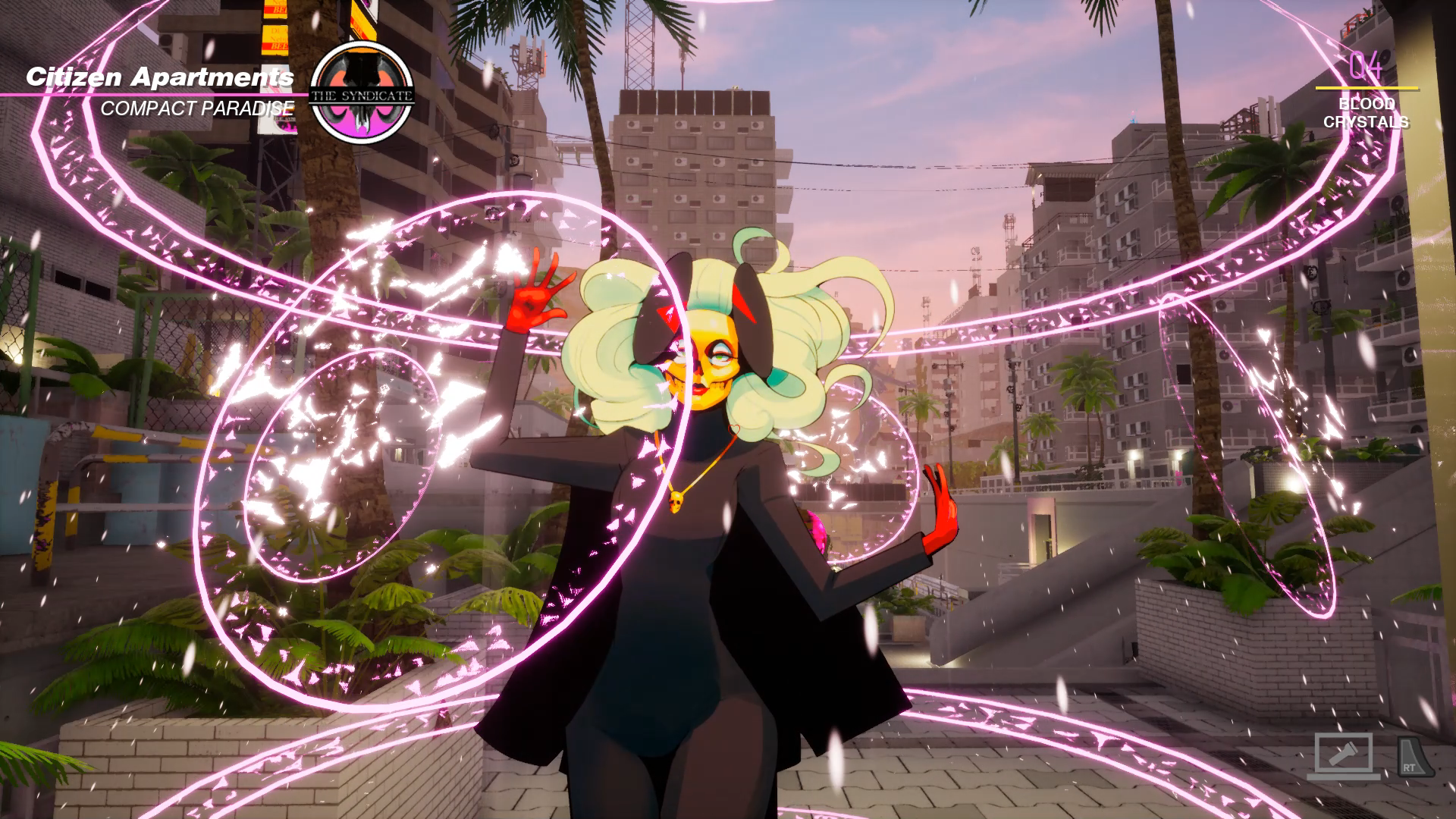
"It has to respect the player, it has to give you freedom, and limitations should be minimal," recalls Crabtree. "Giving players this power was bold, but necessary. If we wanted to have a game where you really do feel like a detective, this was really the only way to do it." And you really can pin the crime on anyone, including people who are (well, as far as I know) completely innocent, which sets Paradise Killer apart from other detective games.
"The original version of the game went one step further, and we actually had to dial it back," says Smith. "In the current game, when you get a piece of evidence, your computer categorises it for you. But we originally didn't do that." In this version, you had to categorise evidence yourself, deciding which case it was relevant to. That sounds simple enough, but when you consider the sheer volume of evidence in the final game, it would've been an impossible task.
We don't like it when games pull tricks on the player
"The judge guides you through the case file for each crime when it's time to do the final trial at the end, which is a way of controlling and supporting the game's open-endedness," adds Crabtree. "It helps you understand the story without throwing in a load of ambiguity that you can never resolve."
Reading forums after finishing Paradise Killer, I saw some confusion about the story. Is there actually a concrete set of events, or does the game adjust itself to suit the evidence you found? "The one consistent truth behind the game is super important,"says Smith. "We don't like it when games pull tricks on the player. There's always a truth behind what happened, and that's why you come in after the murder. Everything that occurred the previous night is fixed."
"It's a tough concept to sell someone on," he adds. "When we say you can build your own case and accuse absolutely anyone, people think we're somehow changing the timeline of events to reach an ending. But we never do that. I wrote a timeline of events that I stuck to rigidly while writing the story."
Urban myths
Kaizen also had to consider players who might find themselves overwhelmed by the game's bizarre mythology. Before I even thought about solving the case, I had to spend time getting my head around the island's arcane lore, Lovecraftian pantheon of alien gods, and really odd character names, including Witness to the End and Doctor Doom Jazz. To help, Smith decided that the game's AR mode, which highlights the locations of suspects, would also point players towards an important crime scene to get the investigation rolling.
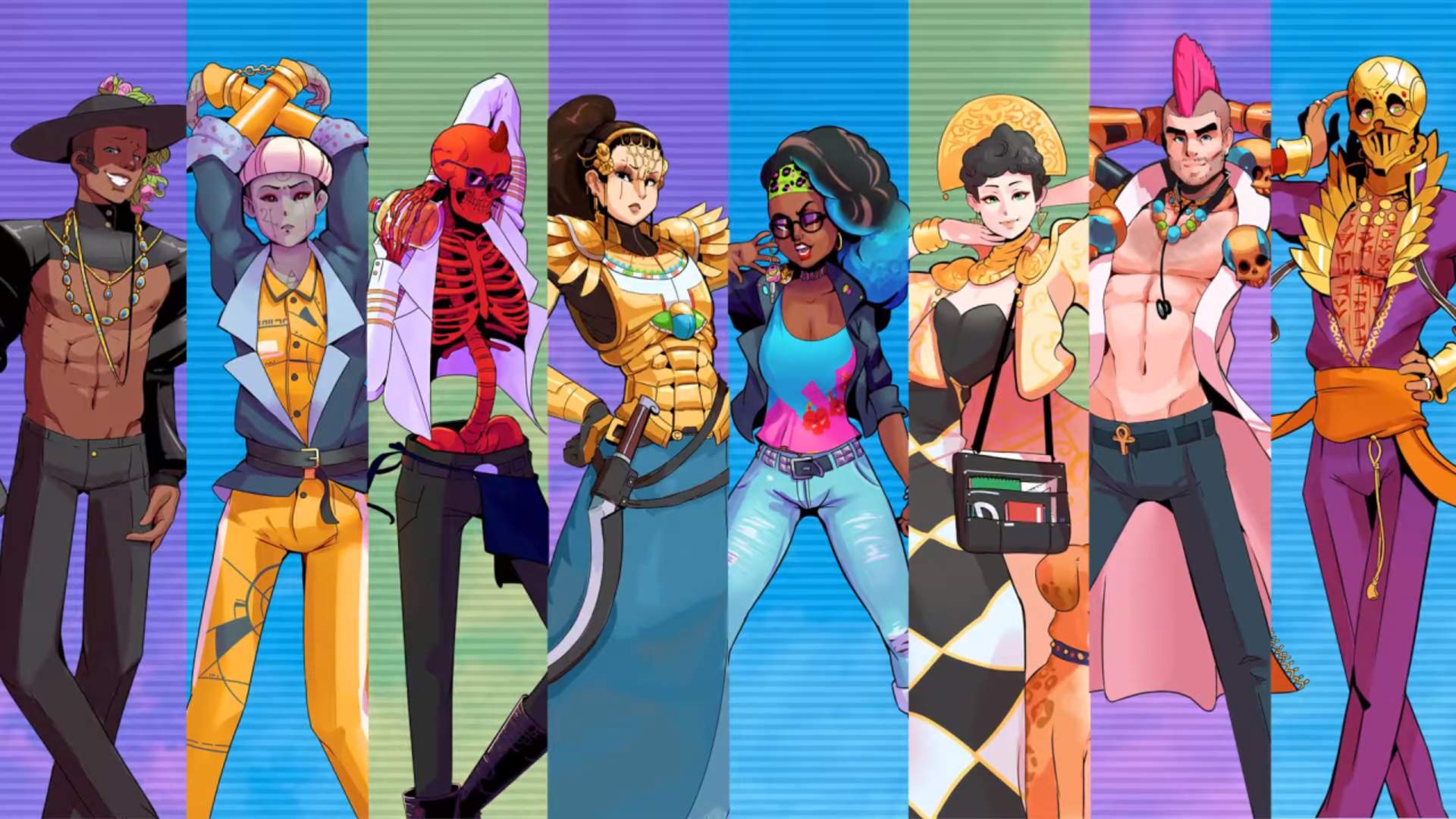
"We added this because there is that battle the player has to go through, figuring out where they are and what the hell is going on," he says. "This means that when you get the AR tutorial, you see a bunch of suspects to interview, but also a location that is clearly a crime scene. So if you are struggling to understand the lore and depth of this place, there is something to focus on."
There are a lot of characters, all of whom are suspects, which is a lot to process at first. But they're all so unique and vividly designed, thanks to the superb work of character artist Gigalithic, that it's easy to keep track of them all. "That's definitely something we took from Danganronpa," says Smith. "Everyone is really larger than life and has something interesting going on. They're all really memorable characters." Eventually, the more you play, the more you get used to the island's peculiarities and can focus on the case.
Blood money
One element of Paradise Killer that has proved somewhat controversial with some players is its use of a currency called Blood Crystals. These are sprinkled liberally around the island and can be spent on a number of useful things, like upgrades (including a very handy double jump) and secrets from an information broker called Crimson Acid. But it's these Blood Crystals being required to unlock fast travel points, and fast travel, that some people had issues with.
We wanted them to spend time exploring as they moved from place to place
"We didn't want players to fast travel all the time," says Smith. "We wanted them to spend time exploring as they moved from place to place, because there are some difficult, out of the way pieces of evidence to find. In fact, fast travel originally wasn't in the game at all, but not having it requires you to build a masterpiece of world design, to make sure it's worth traversing for upwards of 20 hours, and we weren't confident, or arrogant, enough to believe that we could do that."
"Originally, you had to pay to save," reveals Crabtree. "That's something I think we both still quite like. It's like the ink ribbon system in Resident Evil. But, really, when it got down to it, it felt like we were just doing it because we could. It didn't really serve the game in any way. When you get a currency in a game, I always think it's important not to take it for granted. Like most games, by the end of Paradise Killer you can end up with a surplus of Blood Crystals. But in that early game, it means the cost of your actions is important."
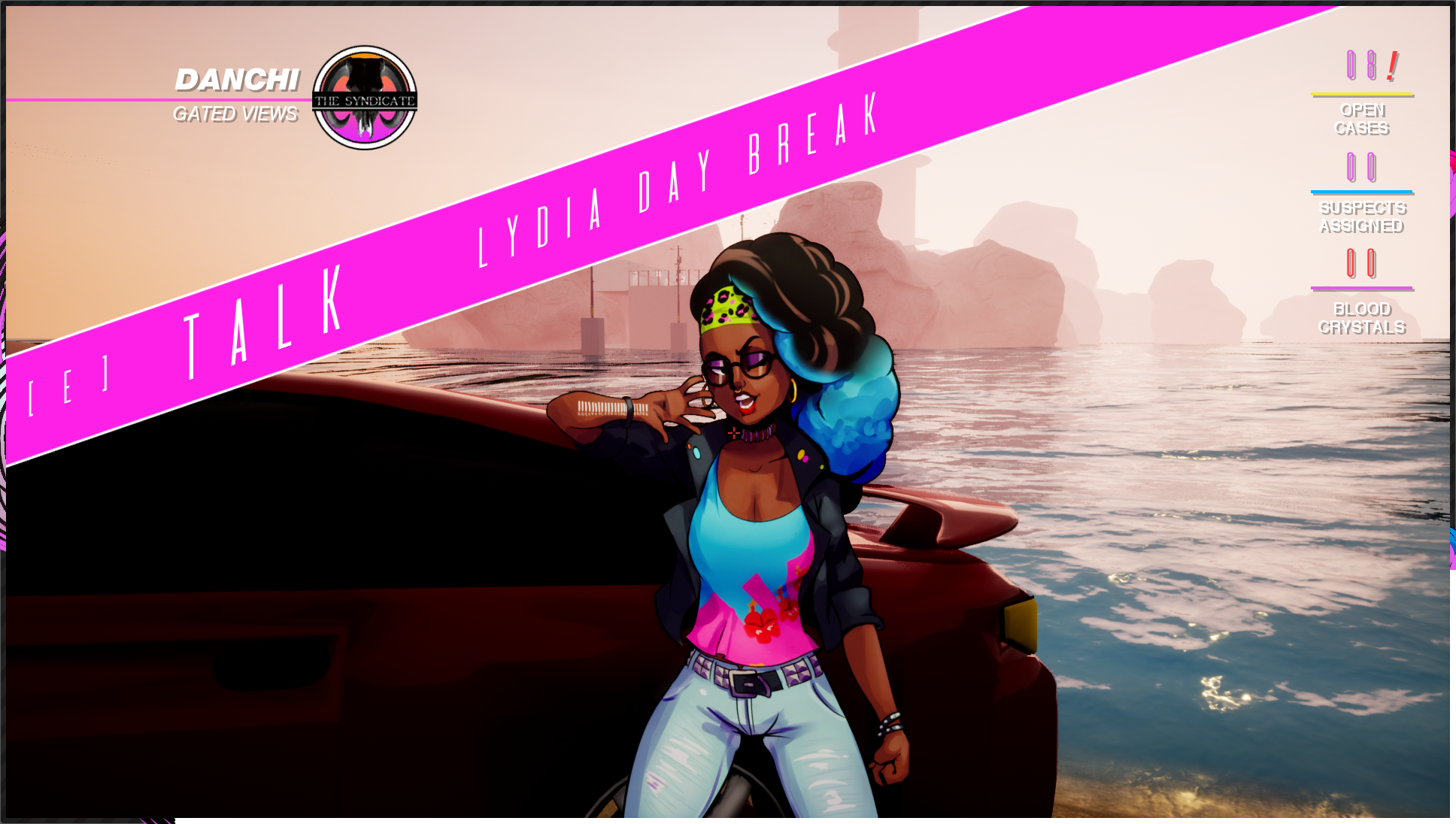
Paradise mixtape
But one thing everyone who plays Paradise Killer will love is the soundtrack. The game features a varied selection of memorable, vibrant, and incredibly catchy tunes—many of which are inspired by Japanese city pop, a loosely defined genre of breezy, funky pop music that incorporates elements of soft rock and jazz fusion. "There was always talk of having a city pop soundtrack," says Crabtree. "That's something we came up with early on. It just suits the kind of relaxed holiday feel that we wanted to create, to counter the darkness."
For a long time Kaizen used placeholder music, but eventually they got enough funding to hire a composer, and Barry Topping was recruited to establish the game's unique sonic landscape. "It was exactly what we wanted," says Crabtree. "He did a great job of interpreting the feel of the game. You do a lot of walking, so he gave the tracks a pounding, walking rhythm. I didn't expect the quality of music we got, and with every track that came in, I knew it was special. It does something you don't see in many games: it stands out."
"I knew it was gonna be good, because he makes good music," says Smith. "But not this good. It was nice bringing him on board, then letting him go wild with it. We gave him very little direction and he kept just submitting tracks. I think there was only one we said no to, because it was a bit too dark and synthy and cyberpunk for what we wanted. Barry did an amazing job making an album, not just a soundtrack. At first each area had its own track, but then we got him to add an intro/outro and implemented the playlist system."
The music in Paradise Killer doesn't play at set points; it's always playing, and you can even skip tracks. Another example of the game's freeform approach. "They wanted to have a playlist-based system, and we talked about how we could tackle that," says Topping, who writes music under the name Epoch. "There was a brief there about the kind of style they wanted, what they thought would fit the game. But I was given a lot of freedom to interpret that however I wanted within the very small number of limitations they gave me."
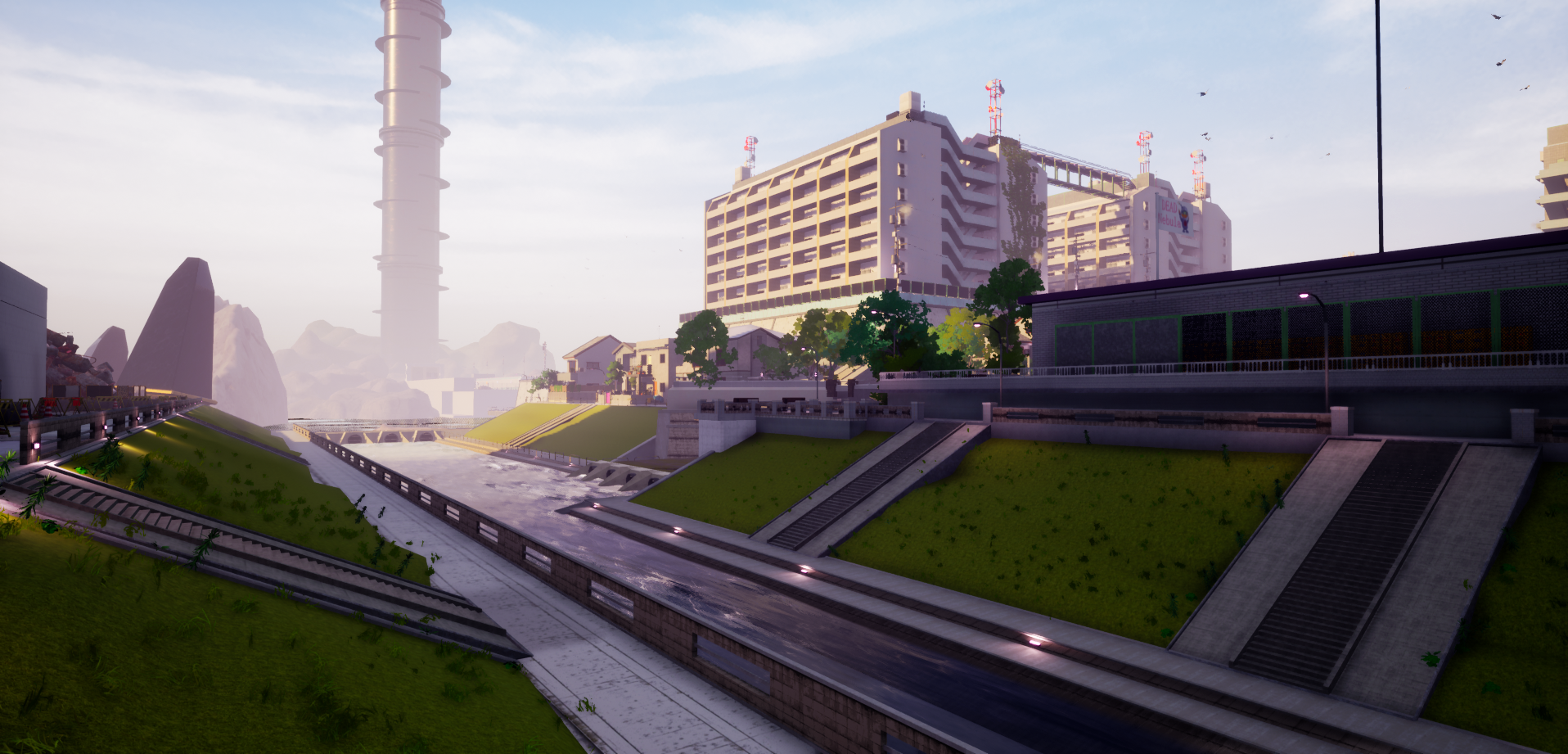
It was about five months of me sitting in my wee home studio just absolutely going for it
"We like games with a playlist system and a lot of different artists on the soundtrack," says Topping. "But in Paradise Killer there's obviously only one artist, which is me, so when I composed the soundtrack I tried to create as wide a spectrum of styles as possible so it never ended up feeling repetitive or samey. The bulk of the soundtrack was recorded in my house from January to the end of May. It was about five months of me sitting in my wee home studio just absolutely going for it."
At first, Topping and Kaizen imagined something akin to the radio stations in Grand Theft Auto. "We briefly imagined doing a full-on vaporwave radio station," says Topping. "That never happened, but over time we honed in on what was fun about the playlist system. I just had to trust the player. I did my part by making a wide array of music styles, so there were tracks that would be appropriate for every situation. I've spoken to people who say they switched to a specific song before doing something. That's exactly what I wanted."
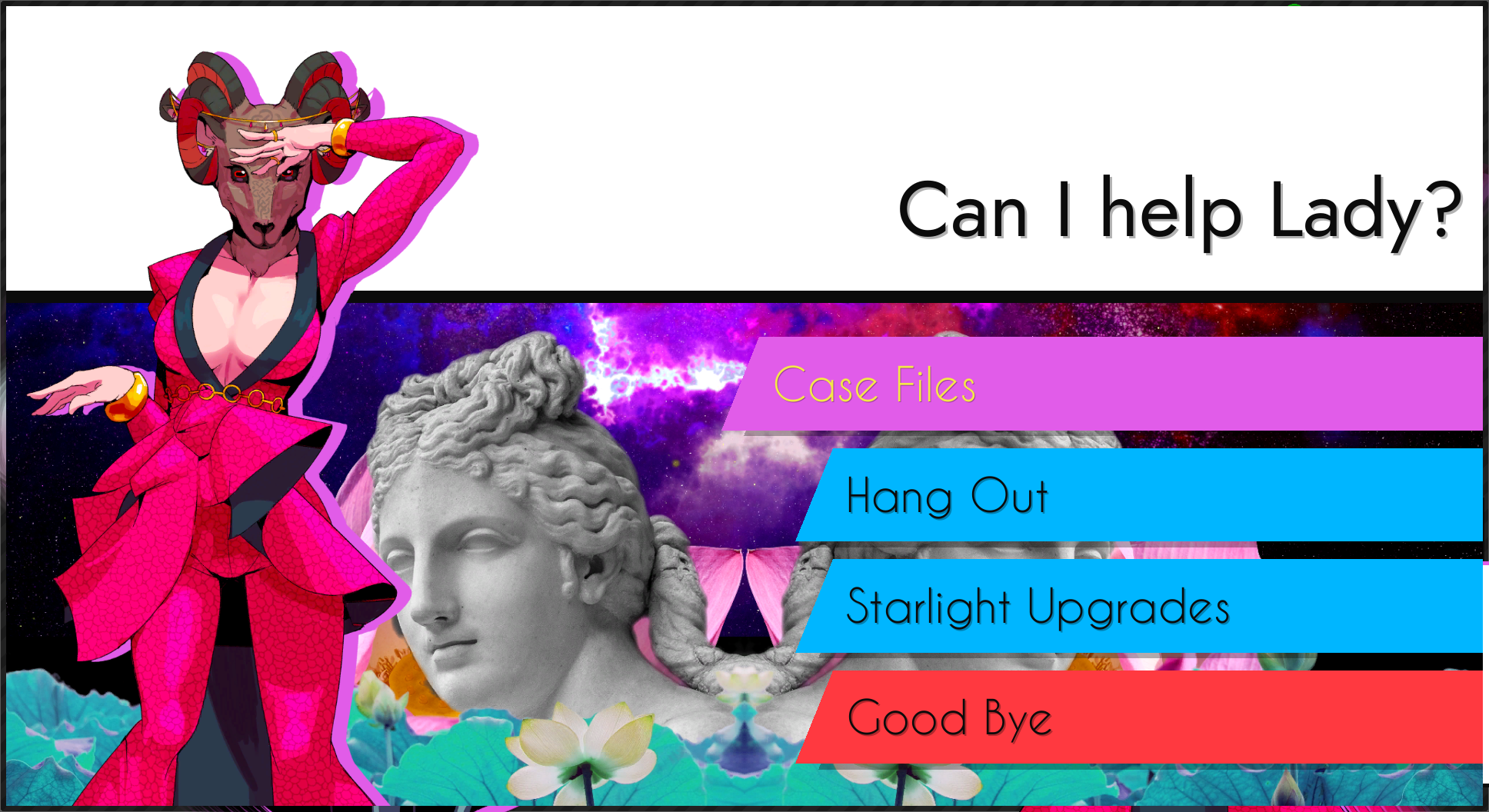
Bad influence
The Paradise Killer soundtrack dips into a lot of different, but thematically similar, genres, including vaporwave, funk, jazz fusion, and early Japanese videogame music. "Once I had an idea of what the game was about, I started doing stuff I thought was cool," says Topping. "A lot of it is inspired by '90s videogame music. I love the music from Konami and Sega arcade games, PC Engine CD, anything like that. When music moved from chiptune to Red Book audio, people just went off the charts. So much of what was happening with game music in the '90s was also happening in jazz fusion."
Topping also made sure that, as well as being catchy, the music also tied into the game's themes. It becomes obvious early on that this so-called paradise isn't quite as idyllic as it first appears, and that it has a dark side. "I love the game's Satanic imagery," says Topping. "I wanted to have references to that, and a kind of demonic energy, in the soundtrack. There's a track called The Lemegeton Bop, named after the Lesser Key of Solomon, a codex of demons."
"The song End of the World is literally about the end of the world, in terms of the island sequence ending. Last Dance XX also references this, and I thought it would be great to have this really opulent track to go along with it. Leaving is a sad, synthwave tune, and when I was writing it, I was imagining being a citizen in this world, knowing the citizen slaughter ritual was coming up. I wanted to capture the feelings of the people on the island in the music."
Topping also worked on the game's sound design, and even provided the voice of a character. "I mastered most of the voice acting, which was difficult because of the coronavirus," he says. "They were coming from different people, from different recording sources, so matching it all was quite difficult. And yeah, I also voiced Doctor Doom Jazz. From the start I was like, please put a Scottish character in. They weren't sure it would fit, but they gave in."
Art attack
Paradise Killer is as exciting to look at as it is to listen to, yet Smith, who handled a lot of the art, had never even textured a cube before starting work on the game. "This was my first time being an artist," he says. "So Rachel (Rachel Noy, an experienced 3D artist who contributed to Paradise Killer) came in to help sort out all the lighting values, post-processing, and stuff like the crystal shader for the big religious statues scattered around the island. Rachel was like my fire extinguisher. If something went wrong I'd call her over to help."
"It was all hands on deck, very DIY," says Noy. "A lot of us did a lot of bits and pieces here and there, just because of budget and time, both of which were lacking. A lot of game designers in AAA have done 3D work before. They use it to block out levels and stuff. But Oli had never done it in an art sense, so there were just some fundamental things that I helped him with."
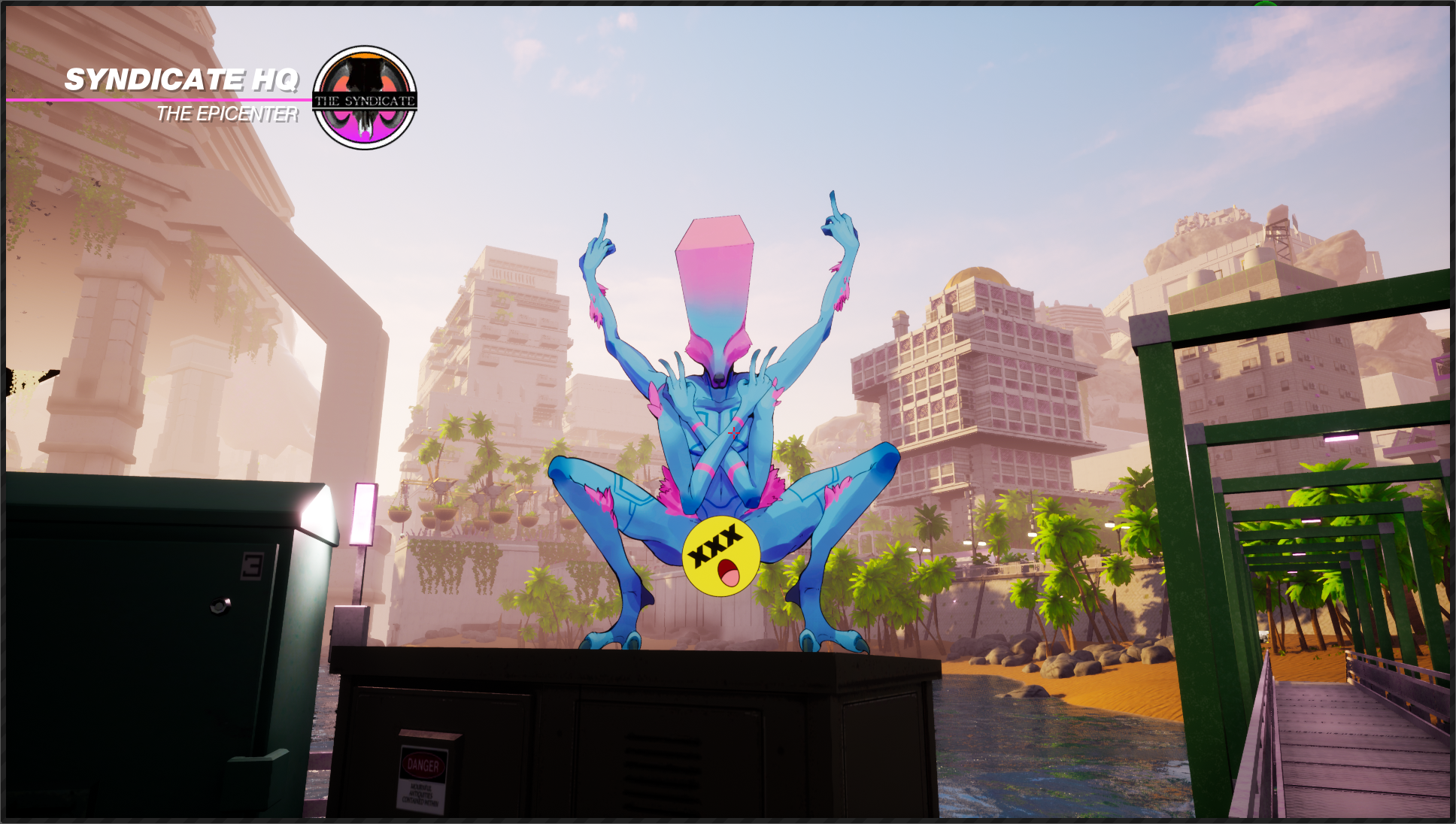
Being a small team with limited resources, Kaizen relied on assets from the Unreal Marketplace, manipulated to fit the game's distinctive aesthetic. This included the aforementioned statues of the gods, which represent the mythology's strange collective of alien deities. "They were all kitbashed out of different parts," says Smith. "For a long while we used generic statues for them. Then about a year ago I had to go and write the backstories for all the gods, and that was just a case of looking through our assets and bashing stuff together."
As for the overall style of the game, including its use of colour and its clean, bright UI, Japanese city pop was once again an influence—specifically city pop album covers, which often feature palm trees, sparkling ocean waves, and dreamy beach scenes. "Growing up I loved playing Road Rash, which had a visual style influenced by grunge album covers," says Noy. "So we thought, what if we did the same in Paradise Killer, but for Japanese city pop? So we took aspects from those album covers and incorporated them into the world."
Killer7, a deeply weird action game developed by Grasshopper Manufacture, was another big influence on Paradise Killer's aesthetic, as well as FromSoftware's Bloodborne. "Killer7 has wonderful, bold shapes and colours, but because it's all on-rails, there's no way to explore it," says Smith. "Then there's Bloodborne, which is the complete opposite. It's so cluttered with detail that it's almost too much. The architecture is so ornate and finely detailed, and you get really drawn in by it. You want to run up and look at every object. I wanted Paradise Killer to be similarly dense, but with Killer7's big, bold shapes."
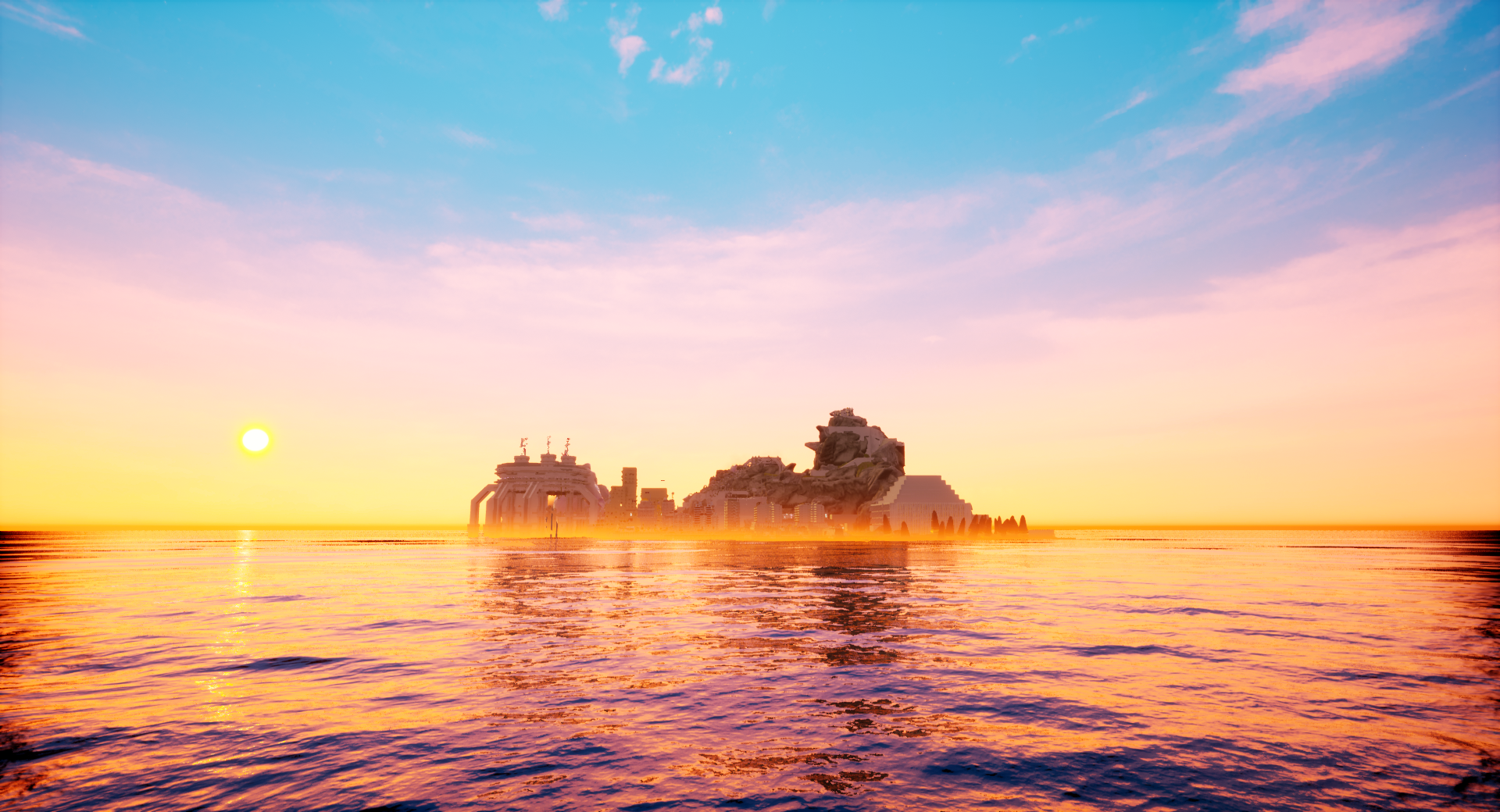
Ride the wave
Read pretty much any review of Paradise Killer and you'll almost certainly see a reference, or several, to vaporwave. And while this lo-fo, nostalgic aesthetic is a clear influence, look beyond the surface and it's obvious that it's just one of many visual styles written into the game's DNA. "It's definitely inspired by vaporwave," says Smith. "Not just in terms of the aesthetic, but the feelings and counterculture of it. But we didn't actually set out to make a vaporwave game."
"The Syndicate is creating this so-called paradise, and they are the bad guys in this world," he says of the people who rule the island the game is set on. "The things they create are built through arrogance, and there's a level of superficiality to the island, their plans for it, and their personal goals. Vaporwave criticises the superficiality of capitalism, so I wanted to make sure some of that made it into the game. Some people picked up on that, some didn't. One review said we were just riding on the back of it, using it for a cheap aesthetic."
We didn't actually set out to make a vaporwave game
"I think we took a lot of inspiration from the same things that inspired vaporwave," adds Noy. "City pop is sampled a lot in vaporwave. But there's a lot of other stuff in there too. When you're set free as an independent developer, you don't have people telling you not to do stuff. We've taken things from so many places, and people are picking up different influences, which is kinda cool. Although I never expected vaporwave to stick with people as much as it did."
"It's an easy touchstone for people," says Smith. "A lot of my influence for this actually came from weird PlayStation games like LSD: Dream Emulator and Germs, which was a 3D open world game that looks like the background of a vaporwave album cover. Games like that share a lot in common with vaporwave, so when I get inspired by those kinds of things, you naturally see some of the same visual style coming through in Paradise Killer."
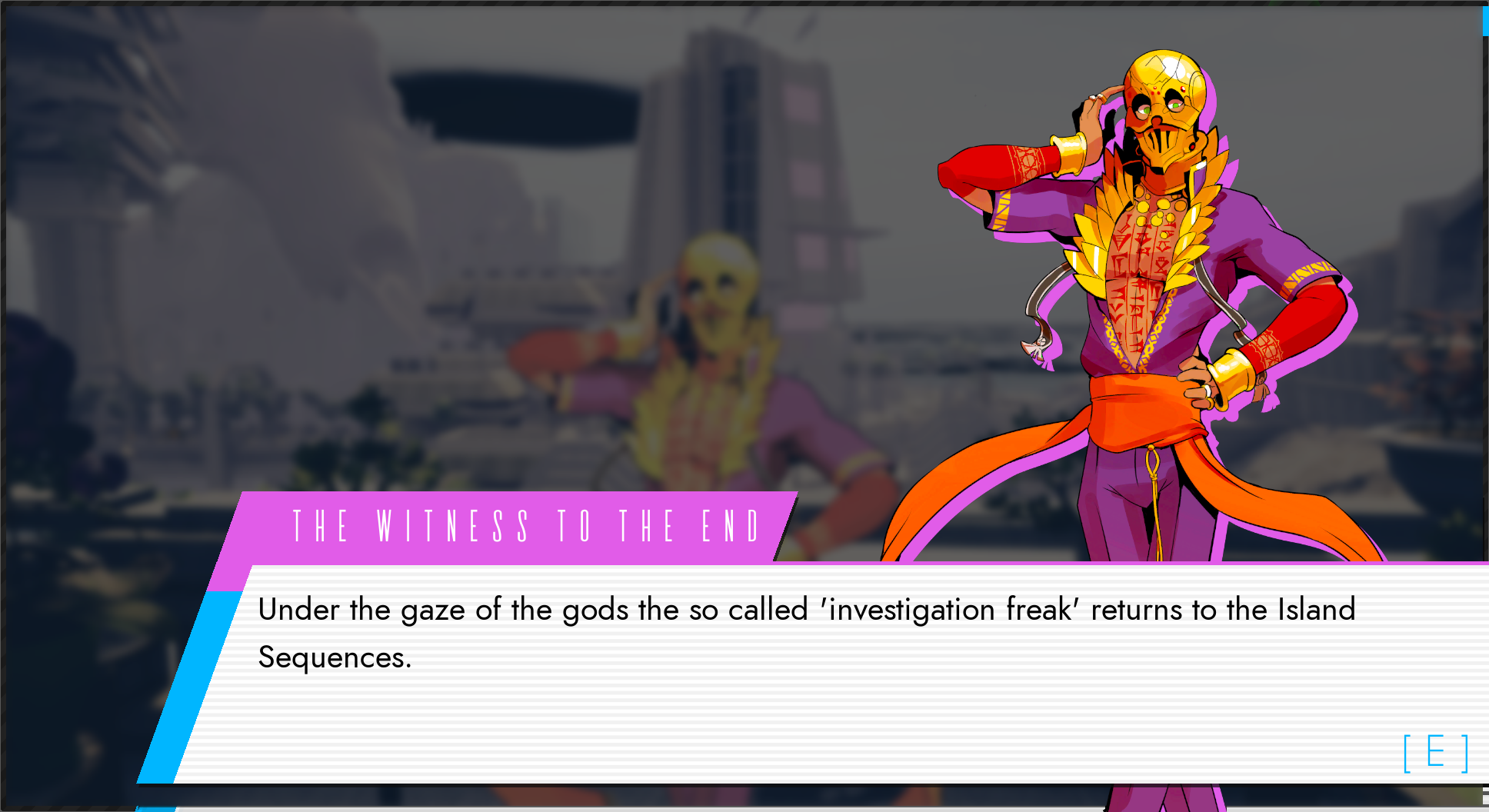
"Capitalism takes any style it wants and churns out something insipid, which is what vaporwave is against," Smith adds. "But when we took elements from vaporwave, we did it with respect, which that one review didn't really pick up on. But I'm happy other people have seen past the aesthetic and picked up some of the themes we were trying to communicate through the art."
The magic of Paradise Killer is that, despite being influenced by so many things, it has a completely unique personality of its own. And aside from its beautiful art and stellar soundtrack, it's also one of the best detective games ever made. Most detective games nudge you from clue to clue, but Paradise Killer leaves everything up to you, from the first piece of evidence to the final trial. It's remarkable that a game like this basically came out of nowhere, from such a small team, and I can't wait to see what Kaizen dreams up next.
If it’s set in space, Andy will probably write about it. He loves sci-fi, adventure games, taking screenshots, Twin Peaks, weird sims, Alien: Isolation, and anything with a good story.


